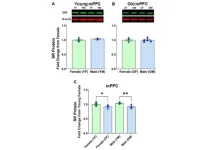(Press-News.org) Peer-reviewed / Systematic review & meta-analysis / People
Embargoed access to the paper and linked comment and contact details for authors are available in Notes to Editors at the end of the release.
The first meta-analysis on the incidence of antidepressant discontinuation symptoms includes data from over 20,000 patients gathered from 79 randomised controlled trials and observational studies.
Overall, approximately one in three patients reported a discontinuation symptom but the new study aimed to distinguish between symptoms directly caused by stopping medication, and other 'non-specific' symptoms that may be associated with patients' or practitioners' expectations (the nocebo effect).
Study concludes that one in six to seven patients will experience one or more discontinuation symptoms directly caused by stopping the medication, and one in 35 will likely experience severe symptoms.
Authors highlight that plans to discontinue an antidepressant should be made jointly with patients and doctors, and that patients should be monitored and supported, in particular patients who develop severe symptoms and may be at risk of disengaging from care.
For someone stopping taking antidepressants, the risk of experiencing one or more discontinuation symptoms (also called withdrawal symptoms), such as dizziness, headache, nausea, insomnia and irritability, due directly to stopping the medication is 15% (equivalent to one in six to seven people), according to a systematic review and meta-analysis published in The Lancet Psychiatry.
The analysis also found discontinuation symptoms that patients describe as severe, and which may have led to patients dropping out of a study or restarting on antidepressants, occurred in about 3% (one in 35) of patients stopping antidepressants.
“There’s strong evidence that antidepressants can be effective for many people who are experiencing a depressive disorder, either alone, or alongside other treatments such as psychotherapy. However, they do not work for everyone, and some patients may experience unpleasant side-effects. In patients who have recovered with the help of antidepressants, the decision from doctors and patients may be to stop taking them in time. Therefore, it’s important both doctors and patients have an accurate, evidence-based picture of what might happen when patients stop taking antidepressants,” says Dr Jonathan Henssler from Charité – Universitätsmedizin Berlin.
He continues, “Our study confirms that a number of patients coming off antidepressants will experience discontinuation symptoms, and for a few, these will be of a more severe extent. It’s important to note that antidepression discontinuation symptoms are not due to antidepressants being addictive. There is a crucial need for all patients stopping antidepressants to be counselled, monitored and supported by heath care professionals. However, our findings, which consolidate data from a large number of studies, should also provide reassurance that rates of discontinuation symptoms are not as high as some previous single studies and reviews have suggested.”
Previous studies have estimated that over half of patients experience discontinuation symptoms when stopping antidepressants, and that half of the symptoms are severe. However, many of these estimates are based on observational studies which cannot reliably determine cause and effect. On the other hand, well-conducted randomised controlled trials (where half of the trial population are offered a placebo, or dummy pill, and the other half are offered the medication) can more reliably distinguish between symptoms directly caused by the medication and ‘non-specific' symptoms that might be driven by patients’ or practitioners’ expectations.
The aim of this study was to review all available evidence to establish the probable incidence of discontinuation symptoms caused directly by stopping antidepressant use, the probable incidence of severe symptoms and the differences between different types of antidepressant. The researchers conducted a review and meta-analysis of 79 trials (44 RCTs and 35 observational studies) which included data from 21,002 patients, 16,532 discontinuing from antidepressants and 4,470 from placebo, with an average age of 45 years, and with 72% women.
Overall, the analysis found that a third (31%) of people who stopped taking an antidepressant experienced at least one symptom, such as dizziness, headache, nausea, insomnia and irritability. Severe symptoms occurred in about 3% (one in 35). Stopping taking imipramine (Tofranil), paroxetine (Seroxat) and (des-)venlafaxine (Pristiq) was associated with a higher risk of severe symptoms compared with other antidepressants.
When looking specifically at the results from randomised controlled trials, one in six patients (17%) experienced discontinuation-like symptoms when stopping taking a placebo drug. This suggests approximately half of all symptoms experienced in those stopping antidepressants might be due to negative expectations (the ‘nocebo effect’) or non-specific symptoms which may occur at any time in the general population. In conclusion, the authors estimate that one in six to seven (15%) of patients will experience one or more discontinuation symptoms that are directly caused by stopping antidepressants.
The analysis did not find a difference between studies that applied tapering of the antidepressant and studies with a sudden stopping of the medication. However, authors caution that substantial variation in study designs, such as the duration of taper and type of antidepressant used, mean these are not firm conclusions, and further research is needed. They also highlight how previous single study results indicate that tapering may be helpful in decreasing severity and incidence of discontinuation symptoms.
“We hope the findings from this study will inform health-care professionals and patients about the risk of experiencing discontinuation symptoms when stopping antidepressants without causing unnecessary alarm. Like all medications, antidepressants present important benefits, but also carry risks - including discontinuation symptoms which are also common among a variety of general medications, like drugs for high blood pressure or mild painkillers, and it is important that patients are able to access accurate, evidence-based information under the care of a clinician to discuss the balance of benefits vs risks for them personally. Our findings do not imply that some symptoms experienced by people during antidepressant discontinuation are not ‘real’ or that all discontinuation symptoms are due to expectations on the part of patients. Any symptoms that cause patients discomfort or distress should be taken seriously, and the patient should be supported. The patient and clinician should discuss which of the symptoms might be directly caused by stopping antidepressants and how best to manage all symptoms," says Christopher Baethge, University of Cologne.
The researchers note some limitations of their study, cautioning that the studies included in the systematic review and meta-analysis used a variety of methodologies. Additionally, a challenge in all studies on antidepressant discontinuation symptoms is the possibility of symptoms of re-occurring depression after stopping antidepressants, which may be interpreted as discontinuation symptoms. Although the main analysis included 62 studies, only seven antidepressants were investigated in three or more studies, and there were no studies found on several widely used antidepressants, for example, mirtazapine, bupropion, or amitriptyline.
Writing in a linked Comment, Glyn Lewis and Gemma Lewis from the University College London, who were not involved in the study, say, “…the difference between the active and placebo groups is the important one from a scientific point of view. A rough estimate of the true prevalence of discontinuation symptoms is about 8–14% and of severe withdrawal syndromes about 2%. Reports of withdrawal symptoms that are not compared with a placebo will give a large overestimate of the frequency of such symptoms. Future study of withdrawal symptoms should ensure that comparisons are made with a placebo when possible.”
NOTES TO EDITORS
There was no funding source for this study. The study was conducted by researchers from the University of Cologne, Charité – Universitätsmedizin Berlin, University of Freiburg & University Hospital of Dresden.
The labels have been added to this press release as part of a project run by the Academy of Medical Sciences seeking to improve the communication of evidence. For more information, please see: http://www.sciencemediacentre.org/wp-content/uploads/2018/01/AMS-press-release-labelling-system-GUIDANCE.pdf if you have any questions or feedback, please contact The Lancet press office pressoffice@lancet.com
Quotes from Authors cannot be found in the text of the Article but have been supplied for the press release. The Comment quote is taken directly from the linked Comment.
END
The Lancet Psychiatry: One in six people who stop antidepressants will experience discontinuation symptoms as a direct result, finds most comprehensive study to date
2024-06-06
ELSE PRESS RELEASES FROM THIS DATE:
Antidepressants: new data on prevalence of discontinuation symptoms
2024-06-06
Joint press release from Charité & University Hospital Cologne
How hard is it to stop taking antidepressants? If countless Internet posts and a number of scientific studies are to be believed, discontinuing these medications is highly problematic, and doctors often underestimate the difficulties involved. But it is unclear how common discontinuation symptoms actually are. Researchers from Charité – Universitätsmedizin Berlin and University Hospital Cologne have now conducted a systematic review and meta-analysis. In their article in The Lancet ...
Scientists question effectiveness of nature-based CO2 removal using the ocean
2024-06-06
Limited understanding of basic ocean processes is hindering progress in marine carbon dioxide removal, with the on-going commercialisation of some approaches “premature and misguided”.
In a new paper, scientists from the University of East Anglia (UEA), the University of Tasmania’s Institute for Marine and Antarctic Studies, Centre National de la Recherche Scientifique, and the Institute for Sustainable Development and International Relations, review the climatic effectiveness of four 'nature-based' techniques using marine biological processes.
These involve shellfish cultivation, seaweed ...
Minimum pricing for alcohol helped curb demand during COVID lockdown
2024-06-06
Minimum pricing can be very effective in reducing demand for cheap high-strength alcohol amid concerns about affordability fuelling problematic drinking - according to a study on the impact of the measure during the COVID lockdown.
The research, led by the University of East Anglia (UEA), examined the efficacy of minimum unit pricing (MUP) to help curb excessive consumption following the outbreak of the pandemic in 2020.
As a flat-rate form of minimum prices applying to all alcohol products based on their ...
New home-administered treatment for binge eating disorder shows promising results
2024-06-06
Researchers from the Institute of Psychiatry, Psychology & Neuroscience (IoPPN) at King’s College London have investigated the feasibility of a new home-administered treatment for binge eating disorder. The new treatment combines a gentle brain stimulation technique called transcranial direct current stimulation (tDCS) with a training programme that targets unhelpful patterns of attention around food.
The findings, published in BJPsychOpen, indicate that this might be a welcome new avenue for treatment.
Binge eating disorder (BED) is a serious mental illness that can affect anyone of any age, gender, ethnicity or background. People ...
Nuclear medicine highlighted in documentary series
2024-06-06
Reston, VA—The field of nuclear medicine is in the spotlight this season on the TV documentary Jobs of Tomorrow. The series, hosted by Kristin Marand, explores how technology and innovation drive the changing job market and impact the workforce.
Six episodes of this season of Jobs of Tomorrow highlight the many facets of nuclear medicine and the Society for Nuclear Medicine and Molecular Imaging (SNMMI) members currently working in the profession.
Nuclear medicine is a multidisciplinary field that encompasses physicians, chemists, physicists, pharmacists, and technologists—all ...
Serine racemase expression in the brain during aging in male and female rats
2024-06-05
“The findings of the present study reveal that aging is linked to a decline in serine racemase protein levels across various brain regions [...]”
BUFFALO, NY- June 5, 2024 – A new research paper was published in Aging (listed by MEDLINE/PubMed as "Aging (Albany NY)" and "Aging-US" by Web of Science) Volume 16, Issue 10, entitled, “Serine racemase expression profile in the prefrontal cortex and hippocampal subregions during aging in male and female rats.”
Aging is associated with a decrease in N-methyl-D-aspartate (NMDA) receptor ...
Virginia Tech researcher helps reach nutrition security goals
2024-06-05
Food is many things.
It nourishes our bodies, delights our senses, and gives us something to gather around. Food is also a powerful cultural symbol, reflecting traditions, values, and histories of communities around the world.
But for a researcher in the College of Agriculture and Life Sciences, food is also medicine.
Bailey Houghtaling Ph.D. ’19, a registered dietician, is working to promote overall wellness among low-income individuals experiencing food insecurity, aiming to prevent or treat diet-related diseases.
“Access to enough nutritious food is essential for individual well-being,” ...
William T. Grant Foundation announces funding for UT, Cherokee Health Systems for research-practice partnership
2024-06-05
Trustees of the William T. Grant Foundation, the Spencer Foundation, the Doris Duke Foundation and the Bezos Family Foundation have approved funding for the winners of the 2024 Institutional Challenge Grant competition. The University of Tennessee, Knoxville, and Cherokee Health Systems will receive $650,000 to grow their unique research-practice partnership — and to learn how to implement community-engaged scholarship that results in ongoing positive outcomes.
UT has a long history of working with CHS, a federally qualified ...
Democratizing plant research: A new cost-effective solution for advanced phenotyping
2024-06-05
Phenotyping, which involves assessing observable plant characteristics, is crucial for understanding plant development and response to environmental stresses. Traditional methods are often cumbersome, costly, and destructive, limiting research scope and scale. A new system of affordable, mobile, and high-throughput phenotyping tools is making the technology accessible to a wider range of users.
The "all-in-one" solution, developed by a team at the Boyce Thompson Institute (BTI), includes low-cost hardware designs, data processing pipelines, and a user-friendly data analysis ...
Multiple randomized trials prove more stroke patients can benefit from thrombectomy
2024-06-05
FOR IMMEDIATE RELEASE: June 5, 2024
CONTACT: Faith James
fjames@vancomm.com or 202-248-5450
Multiple Randomized Trials Prove More Stroke Patients Can Benefit from Thrombectomy
Society of NeuroInterventional Surgery issues update to standards and guidelines following research in favor of minimally invasive procedure for deadly type of stroke
FAIRFAX, Va. — Access to thrombectomy should be expanded to include patients who experience basilar artery occlusion (BAO), a deadly type ...



